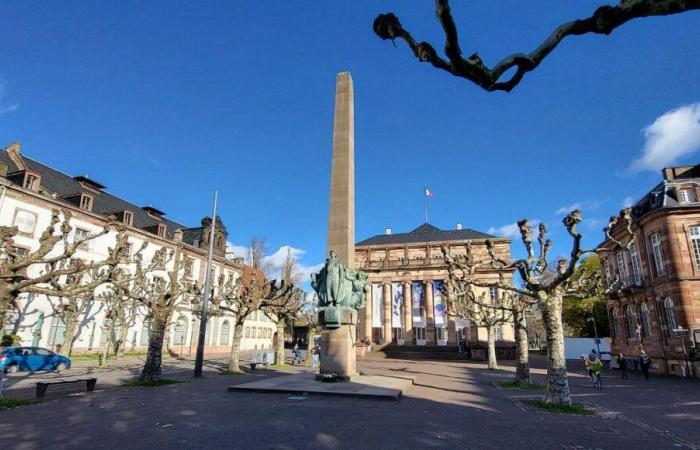80 years ago, on November 23, 1944, General Leclerc's 2nd armored division entered Strasbourg. At the end of a lightning offensive, the 2nd DB liberated the city from the Germans who had occupied it since June 1940. This was not the end of the war in Alsace, since the Colmar pocket would not be taken until February 1945, but a very strong symbol of the reconquest of France by its soldiers, supported by the allied armies.
This Saturday, for the 80th anniversary of this liberation, it is a national commemoration which is held in Strasbourg, in the presence of Head of State Emmanuel Macron, from 11:30 a.m. In the afternoon, the President of the Republic will visit the site of the Natzweiler-Struthof concentration camp, then the Alsace-Moselle Memorial.
The essentials
- The Emmanuel Macron's program starts with a commemoration ceremony at Place Broglie (11:30 a.m.), where the monument honoring Leclerc and the 2nd DB is located.
- Emmanuel Macron goes at 12:30 p.m. to University Palace to give a speech and pay tribute to the historian and resistance fighter Marc Bloch.
- More than a deliverance for its inhabitants, the Liberation of Strasbourg is a symbolic victory and the accomplishment of oath made by Leclerc to Koufra a March 1941.
- A strong word is also expected from the head of state on the fate of the 130,000 people forcibly incorporated from Alsace and Moselle.
Listen to the special show on France Bleu Alsace (11 a.m.-1:30 p.m.)
France Bleu Alsace offers you follow the commemoration ceremonies live from 11 a.m. with our reporters at Place Broglie, at the University Palace, as well as at Struthof, for insight into the history of the discovery of the camp on November 25, 1944.
Alongside Aurélie Locquet and Maxime Dillinger, Lieutenant-Colonel Guillaume Leuenberger, head of the operational office of the 2nd Armored Brigade, which succeeded the 2nd DB.
loading
The mayor of Strasbourg at the war memorial
First stage of the commemoration of the 80th anniversary: the mayor of Strasbourg, Jeanne Barseghian lays a wreath in front of the war memorial, Place de la République, in the presence of the German ambassador and representatives of the cities linked to Strasbourg by the history like Périgueux, Stuttgart, Dresden and Oradour-sur-Glane.
Paola Guzzo
“Celebrating the liberation of Strasbourg means committing ourselves to preserving what constitutes us”wrote the mayor of Strasbourg in a press release published the day before the commemorations, “The history of Strasbourg, of its Liberation, is of a completely different nature from that of other cities in France. So is its commemoration. And it is this very unique story that gives us today, all together, a particular responsibility. 80 years later, let us be the smugglers and actors of the Europe of peace that we have inherited.”
Our essential articles on the Liberation of Strasbourg and Alsace:







